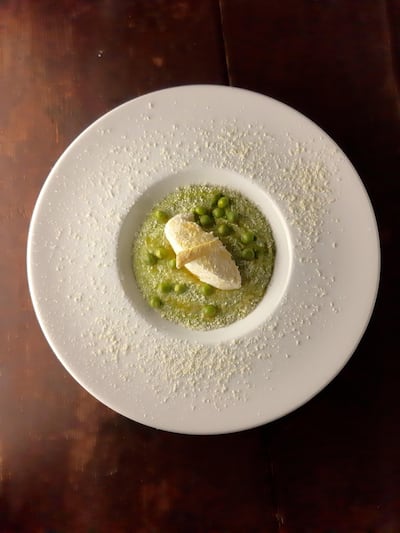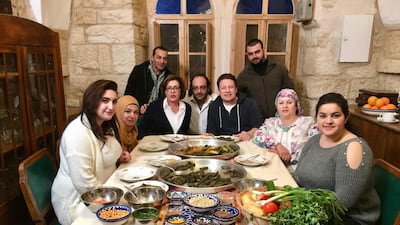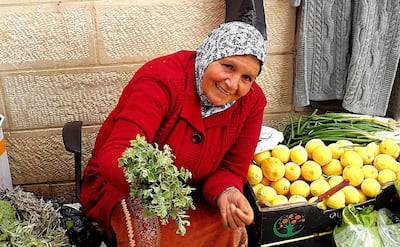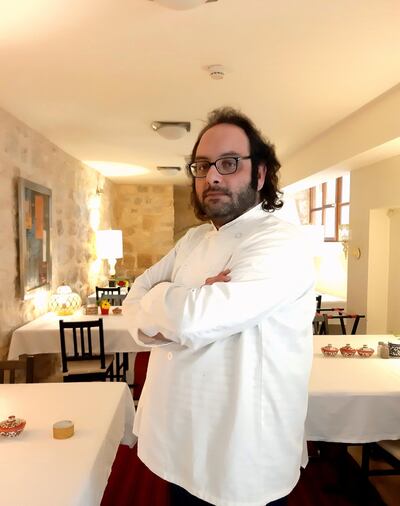When Franco-Palestinian chef Fadi Kattan heard Jamie Oliver was heading to Israel to shoot an episode of his new cooking show, he decided it just would not do. Instead, he and his London PR agency lobbied the celebrity chef to come to Bethlehem, where Kattan owns and operates the boutique Hosh Al Syrian guesthouse and its celebrated Fawda Cafe.
"We said you can't do Israel alone; you should do Israel and Palestine," Kattan tells me. "We didn't have any idea what the show would be about. We just knew how important it was to reflect Palestinian cuisine in it."
Thankfully, Oliver wasn't hard to convince. Kattan says that after winning over the team with the idea, Oliver approved the visit immediately. And so it happened that Kattan spent a chilly morning in February wandering through the market in Old Bethlehem with Oliver in tow, teaching the world-renowned chef the ins and outs of Palestinian cuisine. "He had knowledge [of the situation], but he left with much more understanding. There was a lot of stuff that will never be on the show, but he was extremely curious about a lot of things, politically also."
Oliver's new vegetarian cooking show, Jamie's Ultimate Veg, is currently screening on Fox Life. It takes the exuberant chef across the world as he meets local cooks and vendors to learn how to create region-specific meat-free dishes. And, thanks to Kattan, one of the locations Oliver visited in the six-episode series was the West Bank and its colourful streets .
Kattan opened the Hosh complex in 2015 as a way to bring gourmet Palestinian fare to life. He did so by employing the French cooking techniques he had learnt through years working beyond the Israel-imposed Palestinian border wall – from the Lycee Francais de Jerusalem, a French international school in the city, to an Italian restaurant in Paris, the InterContinental Hyde Park Corner in London and the InterContinental Bethlehem that closed during the Second Intifada.

The chef comes from one of the oldest Christian families in Bethlehem, growing up in the holy town just off Star Street, its most famous boulevard, and is a vocal campaigner for Palestinian rights. So it should come as no surprise that he would be the person to persuade Oliver to visit not only his hometown, but his personal kitchen, too. Kattan was overjoyed when Oliver's team agreed to come out beforehand and scout out a location, despite "all the preconceptions" about the country. There was just one initial problem to overcome.
"It snowed. It snows here once a year and that was the only day it snowed. We did a creative visit of the market together and they had to imagine things I was explaining, as it was closed," Kattan recalls. "It was quite a stressful moment... I was thinking: 'How can I convince them that Jamie's going to be seeing fantastic herbs and people when it looks so grim and sad?'"
Luckily, the idea was enough, and about a month later, Oliver arrived for a day crammed full of experiencing the best in Bethlehem gastronomy. To begin, Kattan took Oliver on a guided tour of Old Bethlehem's market. He introduced him to each of his trusted vendors; the elderly woman who travels in from the countryside and sits on the steps near the entrance selling herbs (her name is Um Nabil, although Kattan affectionately calls her "the queen of herbs"); the vendor with "the best courgettes in town", who comes in each day from a small village a few kilometres to the south of Bethlehem; the family-run butchery, where 15 to 20 relatives ply their trade. Kattan's grinning face adorns a wall there, in a framed picture with a messy scrawl signed: "Thanks for the best meat in Palestine."
“He was fantastic in the market,” Kattan says. “As a person, he was beyond what we expected – he comes across as this chef who creates meals simplified to do at home. I wasn’t sure how much time we had and how much he would be interested. But he was extremely kind with people, talking with people selling their herbs,” he reveals.
The second component of Oliver's visit was staged in Kattan's own kitchen. It is there that he invited a group of Palestinian women, including his own mother, to show Oliver how to cultivate true home-cooked Palestinian fare. "The idea was to portray Palestine differently, and have women who represented real Palestine diversity. There was my mother, a friend of hers who is Muslim, and some of my team, so a mix of Christian and Muslim young women. We didn't want the stereotypes of a Palestinian woman."
Kattan decided to teach Oliver a Palestinian staple: stuffed vegetables and stuffed leaves. His mother taught the celebrity chef a recipe of her own for vine leaves stuffed with rice, tomatoes and spices, followed by one of his own recipes for stuffed cauliflower leaves. "While they were cooking, he was trying to understand everything about the food, but also about the story. How the issues appeared. That was quite interesting."
Kattan says he wanted to pay special attention to Palestinian cuisine, rather than Levantine cuisine, which he says is more of the mezzes and meat platters central to many countries in the region. Instead he wanted to highlight dishes such as taboon bread, mansaf (lamb cooked in fermented dried yoghurt) and chicken and rice maqluba, which is Palestine's national dish. He also wanted to highlight the plight of farmers in getting produce around the country, with road blocks and travel bans. Oliver was particularly interested to hear that, Kattan says.
"Palestinian cuisine, for me, it reflects our country. It's a tiny country that has such diversity; on one side, you have the Bedouin tradition, and then you've got the olive groves and the Mediterranean coast. It was on the coffee route and the spice route. We've been occupied by practically every nation in the Mediterranean basin. All of these influences have contributed to our cuisine," Kattan says. "We stuffed the cauliflower leaves with freekeh. Because I think it's very important for us to reclaim freekeh as ours. Israelis are trying to claim all of that as theirs. It was important for Jamie to see Palestinian products."
Kattan also took Oliver for a short culinary tour around Bethlehem – to the oldest hummus shop and a local baker who showed him how to make Palestinian bread. The first episode of Jamie's Ultimate Veg screened on October 6, with the Palestinian episode scheduled for October 14. Kattan tells me he hasn't seen it yet, but saw the episode set in Jerusalem which, surprisingly, he believes was quite well done. "He did that one with a Palestinian, which I think was very important."
While Kattan thinks that perhaps no more than a minute of his sequences will make it into the final cut, he believes the aftermath of even that length of footage will have immeasurable ramifications for the West Bank. "Having a picture of Jamie biting into a cucumber in the market shown around the world is just fantastic, because it shows it's safe and it's clean. It's breaking a lot of stereotypes," Kattan says. "This should be an invitation to all chefs to come to Palestine and find out what our cuisine is. Work with products that you've been using that are Palestinian, but you don't realise because it's been marketed as Israeli. And for non-chefs, it's an invitation for everyone to come and visit Palestine. Come and walk the market of Bethlehem, and discover art and the whole package.
"It's time for people to come and see reality."



